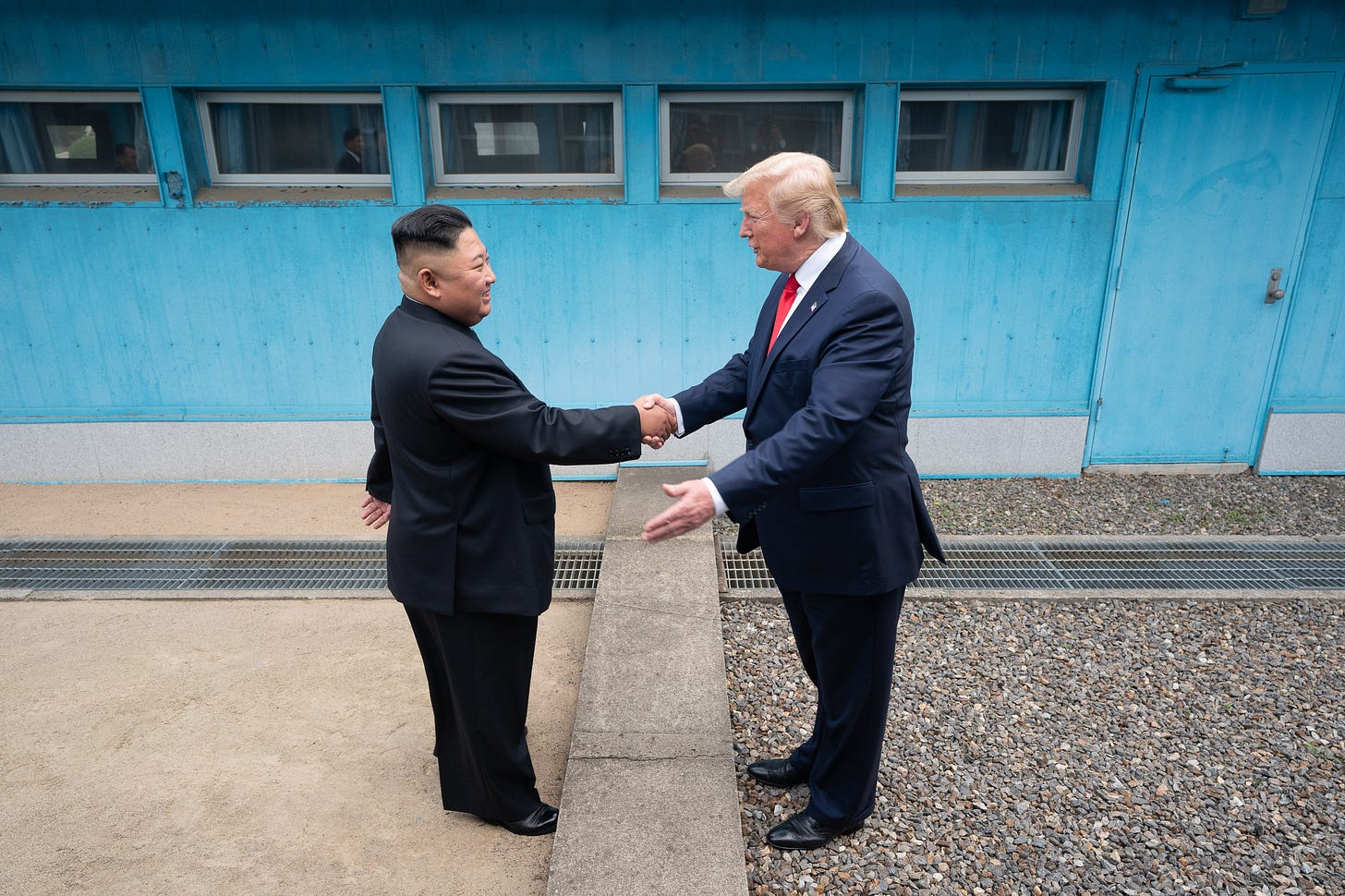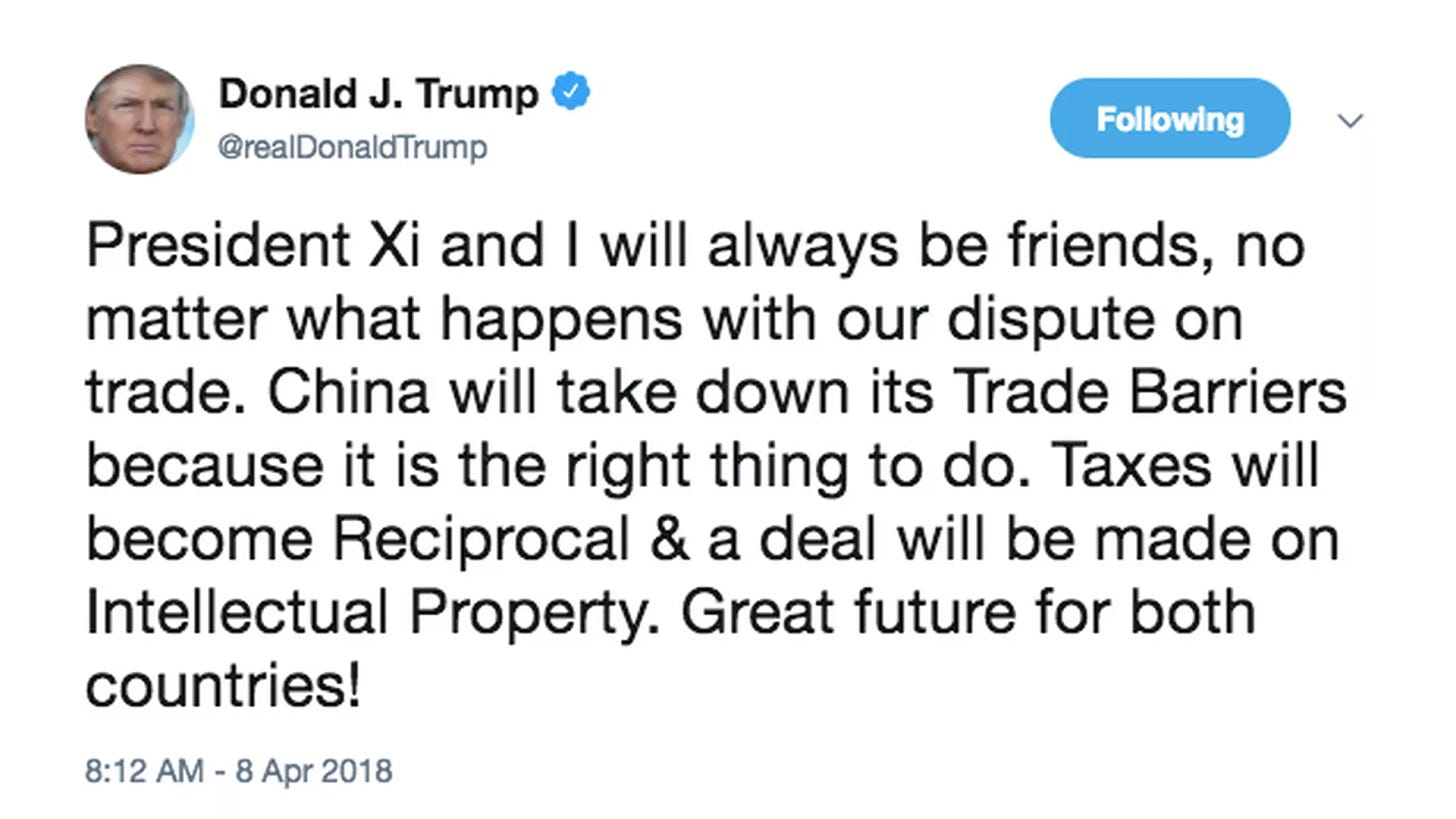The root of negotiation is the mutual capacity for violence
For the most part, conversations > gunfights
In this post I am going to discuss the root of negotiation. And the root of negotiation is the mutual capacity for violence. I will go on to discuss how violence begets trust. Trust begets trust signals. And so on. From there you build society. At least in the human case, you do. It's not quite the same amongst other organisms.
Negotiation is an emergent phenomenon. It is a phenomenon that emerges from the situation where two parties have a common desire, and they each have the capacity to injure the other (swiftly).
To understand why, we have to think about the nature of destruction versus the nature of creation.
Creation is costly. It takes time. It's expensive in every dimension. Destruction on the other hand is usually costly only in one dimension, and that cost is not very high compared to the cost of creation. It's quick. It's cheap. You smash something, it's gone. That thing may have taken an arbitrary amount of time to create.
We see this in nature. Not just amongst humans, but we see this in nature as well. If we take two hungry tigers and put them in a pen together, they won't fight right away. They have to have some reason to fight, beyond just not liking each other. They may enter a contest, but they won't try to kill each other. Because trying to kill each other---pushing a fight too far---is too risky. They won't do that.
A small tussle may be part of a negotiation—part of establishing a pecking order—but there's a fuzzy line somewhere where pushing the weaker one too far becomes a threat to the bigger one. Never back your enemy into a corner. Because the smaller one now thinks he’s facing a mortal threat. That poses a risk to the dominant one of receiving a grievous injury. A grievous injury takes too long to recover from and it may even prove fatal.
So you’ll see these cats signal each other. They’ll give aggression/dominance signals to one another. Those dominance signals sound horrible, but they actually keep the peace.
This isn’t so dissimilar to Trump being very bombastic in negotiations. Remember, Trump was either super hot or super cold in negotiations. He was over-the-top nice to some folks. And then with other folks, he was super bombastic, and sounded very belligerent. But that’s negotiation.
Suppose you’re playing on the same level as somebody else, or you have a mutual understanding. Not that you’re cooperating. Not that you’re friends. You may be in extreme contention. But it’s already understood that there’s a level threat of violence on the table. And it goes both ways. In that case, being polite costs nothing.
If on the other hand you have somebody who’s acted in bad faith over and over and over, though, then the correct strategy is being bombastic and signaling “Hey, there’s a line. You don’t know where that line is. But don’t push it.”
You have to be very clear about that. That’s what those bombastic signals are about.
North Korea’s got a whole cottage industry of saber rattling. I don’t want to get into that because that’s a whole other post. North Korea is the problem that nobody wants to go away because it’s a useful problem. South Korea does not want to have a direct border with China. Russia likes using it as a lever. It’s the problem everybody loves to screw with.
But there’s a line. Nuclear weapons is that line. So we saw an extreme amount of belligerence from the United States towards North Korea. But again, it was signals. It wasn’t like there was about to be a bomb dropped the next day. It was signals.
This is akin to the two tigers example. We’ve got two tigers in an enclosure. They don’t like each other. They’re trying to establish a pecking order. They are both establishing that they are mutually dangerous. They don’t need to get into a fight to prove it. If they do, they’re going to get into a short tussle, and break up. But they won’t really go after it.
Even if you put meat between them. Two hungry tigers. Put a piece of meat between them. They will not go to war with one another. The reason is that a single meal is not worth risking a crippling or life-threatening injury.
Now, put a piece of meat between a small dog and a tiger. The tiger’s just going to eat both of them. The dog’s capacity for violence is so far below the threshold of risk for the tiger that there’s no issue.
So in nature we find this in general. We the bigger cat, or whichever one asserts dominance more clearly, will eat. And then typically they’ll actually share. They won’t take the whole thing. They typically share it with the other cat.
That’s a fascinating thing that we find. And it’s occurring in a complete absence of friendship. And it’s occurring also in a near absence of trust. They start developing trust from these encounters, though. With humans, we have the exact same dynamic.
Negotiation emerges from the mutual capacity for violence.
What is unique to humans—and to some limited extent other primates—is that humans will very often delegate both the capacity for violence, and the authority for violence. Especially the authority for violence. Who gets to decide “we’re going to hit that guy?”
Those things are delegated to a third party. And that’s kind of the basis for society itself. It occurs on many different levels, too.
In the West especially, you’ve got this very strong sense of fairness in interpersonal combat. If a guy gets into a fight with another guy on the street, people usually just kind of watch.
But if a guy got into a physical fight with a woman—like punched her in the face—it’s expected behavior that most men nearby are all going to pile on that dude. Because it’s so unmatched. In the typical case. If the girl is a UFC fighter fighting some dope who doesn’t train, then that might go a different way.
But in the typical case where a man hauls off and punches a woman over an argument, it’s expected equalizing behavior for other men to pile on that guy. Because he’s violating the social trust structure.
There’s a lot of political nonsense around that. But the reality is that overwhelming dominance and violence taken out of step—without some authority that we all agree on—issuing the order for that violence is considered a breach of trust in a functioning society.
It’s considered a breach of trust so extreme that everyone must spontaneously dive in to stop it.
That detail of delegation is interesting. I’ve had a couple of proteges who have mistaken the fact that you can have a contract negotiation without a gun on the table for the idea that somehow humans are above violence. Or that we don’t need violence to create negotiation situations. We do.
Just look at the history of the worl. Any country that even begins to teeter on pure passivism is gone. You have to maintain the capacity for violence. It doesn’t have to be an overwhelmingly dominant capacity for violence.
But the mutual capacity is the key. That’s why The Cold War never became The Hot War.
There were little places where it did become hot here and there along the fringe. But we very rarely had a case where you had NATO soldiers in a live shooting war with Soviet soldiers. We had proxy wars more often than not.
We can argue about the validity of a lot of those. Every situation is a little bit different. There’s a lot to be said about the validity or stupidity of some of those engagements. Not to mention war profiteering and all that.
But if you back up and look at the world from the perspective of an alien civilization, you won’t see individuals making decisions. You won’t see “this guy’s a good guy and that guy’s a bad guy” You won’t care about who this politician is that everybody hates or loves. You will see essentially bacterial colonies organizing and contending with one another.
That’s really the more accurate model: semi-conscious super organisms in contention.
There’s no ability to contend if one party completely lacks the capacity for violence. There is no contention anymore. They just get consumed.
The mutual capacity for violence is the root of negotiation.
Negotiation occurs between individuals and it occurs between societies, or societal organs. The violence itself does not have to be direct. It does not have to be first-party violence. It can be third-party violence. It doesn’t have to be first-person authority over violence. It can be third-person authority over violence. It can be delegated.
This is what we do with the legal system. We have judges. They have authority over violence. If you sue somebody, and they owe you because of a contract violation. The judge will say “you owe them that”. If they don’t live up to it, cops will end up showing up.
Usually like a repo guy would show up to take your car, right? If you fight the repo guy, the cops are going to show up. If you fight the cops, then all the cops are going to show up. You get one bean, you get the whole burrito, it’s over. You’re not going to win that.
Speaking of burritos…
In cases like Mexico where you have a civil war occurring—Americans won’t call it a civil war—that whole situation is kind of comical to me. Just drop the drug laws and the whole thing kind of gets defunded. On both sides, including the DEA. All nonsense.
But the imbalance in society down there—which originates with not following the Constitution of the United States—has manifested the situation in Mexico where the bad-faith actors have proliferated so much that they’ve had to beome good-faith actors. They’ve become so large that they have developed internal community dynamics. They have to keep faith within their communities, or at least within the gang. Within a single cartel you have to maintan faith or it gets very violent. Even internally. You have to establish faith and trust signals with other cartels.
That’s all negotiaton.
There’s a tremendous amount of violence in Mexico because of the drug war. What we see evolving over time is a semi-stable situation. Which is kind of amazing given how hyper-violent that place can get. There you don’t delegate to the cops because you don’t trust the cops. They have a low-trust society. So you get way more violence there.
I live in a high-trust society. We don’t view the cops as the biggest gang. I used to work in parts of Africa and southeast Asia. There it was absolutely true that the cops were the biggest gang. And they were government-funded. You didn’t trust them.
So you’ve got no faith that anybody you sign a contract with is going to live up to it. Unless you’re dealing with another American company. You could sue them under US law. You would never trust a lawsuit that comes up in Filipino law is going to work out. You would never trust that a contract that was violated by the mayor’s friend is going to be enforced. The judge might rule in your favor. Even if he rules in your favor, you have zero confidence that the cops are going to act on your behalf when it comes to wielding violence.
That of course hamstrings society. It breaks everything apart. You can’t get anything done. You can’t do business. Because you can’t do business, people are in poverty. When people are in poverty, they’re desperate. They’re more likely to break faith when they’re desperate. So there’s a spiral.
You notice how many times I’ve mentioned “trust” and “breaking trust”?
That’s because. Mutual capacity for violence begets negotiation. Negotiation begets cooperation. Cooperation begets trust. Trust begets trust signals. Trust signals beget cooperation-by-default. And from there you build society.
Remember the tigers? They have aggression/dominance signals. Those convert after a number of negotiations to trust signals. Trust signals are the opposite of aggression signals. Instead of showing that you’re very aggressive and you’re capable of violence, you wind up signaling that you have concern for that other party, that you care about them. You start showing friendship signals. It becomes common to hop over negotiation and go straight to cooperation.
That’s what happens within families. That’s kind of the definition of a family. A family is a unit where knowledge between parties is so complete that you don’t have to negotatiate 90% of the time. You can jump straight to cooperation. That’s what friendship really is. You’re not wondering what game they’re playing. You know what game they’re playing. They’re playing the “be your friend” game. Trying to help each other out and be good to one another.
The most abhorrent people in society are the people that would pretend to be your friend, take advantage of you, abuse your trust, and then leave you hanging. We’ve got thousands of stories about people like this. This is the basis of the bad guy in most movies. Or in most classical stories, this is the oath breaker, or the cheater. The liar.
Mutual capacity for violence begets negotiation. Repeated negotiation begets cooperation. Cooperation begets trust. Trust begets trust signals. Trust signals beget cooperation-by-default. The pattern of cooperation and trust across a large number of people, that’s the foundation where you start getting culture. You start having to agree on meanings. Your trust signals are no longer just trust signals. They become detailed language.
At our current point in human development, we have the ability to communicate complex ideas in single words. That’s amazing.
Anyway, this idea that violence—whether it’s first-party or third-party violence—mutual capacity for violence is the root of negotiation, is critical to understand if you want to understand anything at all about geopolitics or Entropism.
So as I continue to discuss in different posts different elements of geopolitics and Entropism, we always have to come back to the root. And the root of everything is the mutual capacity for violence. When everything goes wrong and you can’t trust anybody at all. In a trustless environement, the questions you ask are “how bad can this party hurt me” versus “what’s the benefit of working with them?” That’s the lowest level of calculation that occurs between parties.
When you deal with geopolitcs you’re talking about societies (super-organisms) that are semi-conscious at best, they do not have faith. They can only operate on capacity, and evaluate things in terms of capacity. People think “country A and country B are friends.” There’s no such thing as friends in geopolitics. It doesn’t work that way. Not everything is cold and calculated either. There are trust signals that can emerge. But it never rises to the level of actual friendship. That’s not a thing that can happen. No nation has a single brain. There’s something you can kind of tap into that’s similar to that. But there’s no actual think that’s called consciousness across an entire society. It doesn’t work that way.
Maybe in the future with AI or neuralinked thought or whatever. But we’re not there yet. Even then we would have a different model. If you want to understand geopol or entropism, you have to understand that mutual capacity for violence is the root of negotiation.
Violation of trust within a society is the ultimate poison to that society. Right now a lot of the West is on a horribly precipitous fall from a high-trust societies to low-trust societies. You’re about to start seeing low trust. We already see low-trust society type problems manifesting in the West. There will be a culmination. There will be a price to pay for that.
There’s a price to pay for that in an authoritarian society as well. China has completely stripped the public of the capacity for violence. But the third party that’s supposed to wield violence on your behalf is abusing it. That’s not going to work out very well. That’s an extremely unstable situation. That’s going to blow up at some point
Everywhere you see this you will see instability manifest.
Here’s another important idea: the US Constitution is not a legal document, but rather a geopolitical document. As a legal document it kind of sucks. As a geopolitical document, it’s brilliant.
The power mode for the United States is liberty. When your people are free, they have the tendency to do a lot of interesting things, which allows you to be an economic superpower. This isn’t a new idea. Everything I’ve written so far in this post was so obvious to the Founding Fathers of the United States as to be taken as given.
The second amendment is not about hunting. It’s not about self-defense. The second amendment was written at a time when the United States had just fought a war of independence from the dominant international power using privately owned firearms. Not just firearms. They used privately owned cannons and a privately owned navy. The “right to bear arms” is properly framed in a completely different than self-defense or home invasions. That’s not the argument. The argument is to raise the cost of tyranny beyond the capacity of any government. To force them to negotiate.
Negotiation between parties is the power mode for humans. The most powerful mode is cooperation. You give up cooperation between you and the government when you abdicate your capacity and your authority for violence. You can’t do that. Not if you want a stable society. If the government becomes a bad-faith actor (which every government has and/or will) and the public doesn’t have the capacity for violence, then the whole thing falls apart very quickly.
This is why we’re going to see another holocaust in Europe, probably within a decade. The perpetual swinging between right and left that occurs in the United States does not occur in Europe. Europe is pre-set towards authoritarianism. The people have no right to violence, no authority over violence, and no capacity for violence. At least not at an individual level. They’re purely authoritarian. They’re always in a quest for the best dictator that they can find. That’s their notion of “liberty”. Not individual liberty.
The European idea of liberty is that of “human rights”. The State has ultimate power and grants you rights as it deems fit. The American idea is “natural rights”, which come from God, some of which are voluntarily abdicated to the State by the people. The reason this is possible is geography.
This is why “National Divorce” is retarded by the way. The proposal is to sacrifice the United States’ territorial integrity with the idea that it would somehow contribute positively to the cause of liberty. No. It would turn the United States into Europe. That’s the end of liberty.
Anyway. The debate within Europe is whether they should be globalist or whether they should be nationalist (more or less). Authoritarianism is a given. This is always unstable. Europe’s history more closely resembles the modern-day Middle East than it does modern-day Europe. The fake peace we see right now in Europe is temporary. And it’s temporary because the geography of Europe is not conducive to liberty and peace. The United States’ geography is.
That’s why America is special. It’s not the constitution. It’s geography, and it’s the mutual capacity for violence between the State and the people.
“Mutual capacity for violence is the root of negotiation” is the most basic idea in geopolitcs. “Geography dictates what politics are possible” is the central idea. Sacrificing the geography that makes liberty possible is unlikely to lead to more liberty. I’ll grant the premise that I can’t see five steps down an opaque causal chain. But come on.
If you look at your European history, you’ll see that Europe is never really stable. A lot of that instability traces back to periods where you have a government behaving in good faith. Then something changes and they break faith with the public. Now, instead of a government that’s nice that you can trust, you have tyranny. The capacity for violence that the government wields civilly shifts from being aimed at contract enforcement to just being civil coercion.
The people really have nothing to do until by the end of itthey flip out and become so hyper-violent that who own the arms doesn’t matter anymore. The army all quits. The police quit. Everybody picks sides. Then you get Jacobins. Then you get the French Revolution. All this horrible mess before you wind up reforming the country in a new shape.
So if you don’t want this cycle of revolutions, you have to accept that a democratic system contains the ability to have a revolution without a fight. That’s because everybody has the capacity for violence. So nobody’s got an edge on coercion. That means even in the worst case, everybody still has to work together to some degree, or at least cohabitate.
That’s the purpose and the power of the second amendment. The complete departure from constitutionalism in the United States is almost complete at this point. The American Empire is trying to strangle the American Republic. The misinterpretation of the concept of negotiation plays into that to a very strong degree.
That’s all I got for now.
Bye.
















